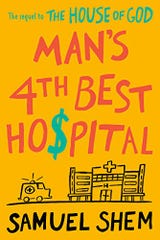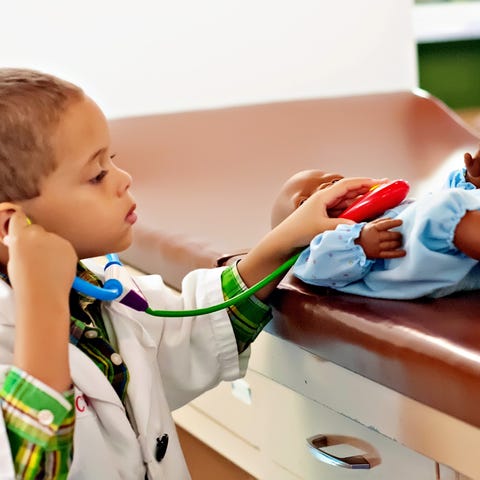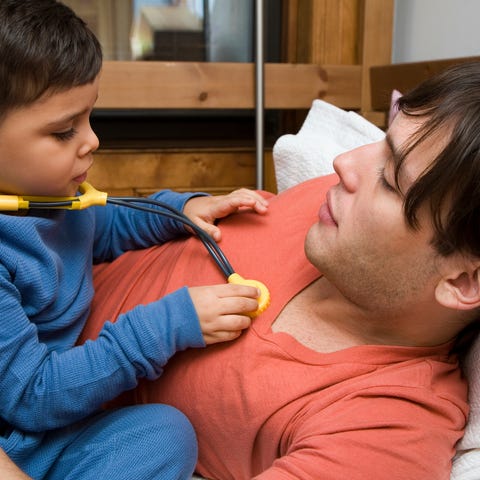The call came at 5:00 a.m., waking us both up. My wife answered. It was our 25-year-old daughter, Spring. She was in pain. My wife handed the phone to me.
“What’s up, hon?”
“I can’t sleep. I felt sick to my stomach when I went to bed, and now it really hurts.” I asked where.
“My right side, low down. Keeps me awake. I’m scared.”
I am a doctor, a product of the Harvard medical system with skills I’ve gathered in decades of practice all over the world.
Through my training, I’d been taught to Rule Out—the standard practice of diagnosis whereby, by virtue of the patient’s history, physical examination, and tests, I rule out each possibility until whatever is left is the likely diagnosis. And so I asked Spring all the critical questions.

Jose Luis Pelaez Inc
“I think you have appendicitis,” I said.
“You always say that,” she replied.

Amazon
Man’s 4th Best Hospital
amazon.com
$27.00
$21.49 (20% off)
BUY IT NOW
Doctors, like it or not, are trained and conditioned to distance themselves from their patients, thinking (falsely) that they have to be objective. But be “distant” from my daughter? Impossible.
Any symptom, such as a cough, rash, diarrhea, or headache, would become a dread diagnosis of the worst case. True, the more common symptoms of dengue fever are high fever, pain, and nausea, none of which Spring ever had, but what about that rash, doctor?

Kristal O'Neal
When Spring was five, her face puffed up like a tomato and she was having trouble breathing. My mind raced through all the usual suspects and landed on the obscure disease tularemia.
Having never actually seen a case of tularemia, and because its symptoms (pain, trouble breathing, swollen tonsils) can be found in so many diseases, I felt very proud of myself for coming up with this tricky diagnosis.
It’s usually caused by exposure to infected animals, including rodents, goats, and rabbits. We had a rabbit! We rushed to the dermatologist. He took one look.
“Poison ivy,” he said. I believe the “. . . idiot” was implied.

FatCamera
After that 5:00 a.m. call, my wife and I drove to meet Spring at the ER. Our daughter was ashen, scared, hunched, and pressing a hand to her abdomen.
Nurses guided us to the emergency ward and put us behind a curtain. Spring was getting worse and worse. She was flushed and then chilled. I told our nurse that I was a doctor and I really thought it was appendicitis and we had to hurry. Neither doctor nor appendicitis nor hurry seemed to register.
I pictured the appendix exploding. I switched from Informed Worry to Parental Hypochondria, a syndrome in which, awash in the most elemental love in the world, we imagine the worst.
I peeked out from the curtain. Nothing.
There did not seem to be any doctors around, and where were all the patients? Then I remembered—and my panic increased. Not only was it a Sunday; it was Yom Kippur. Clearly they were understaffed.
Finally the surgeon arrived, spoke to us calmly and patiently, did a careful exam, and got the results. He declared that Spring had acute appendicitis, and that he would operate right away. I was right this time.

Stella
Spring, brave-faced, waved goodbye to us as they wheeled her gurney down the corridor. The surgical risks, and all the real screw-ups I’d witnessed, flooded my reason. Tears came to my eyes. It turned out that her appendix had indeed been on the verge of rupturing.
I, like most parents, had feared the worst—which does happen, remember. As a doctor, but especially as a father, I have an urge to “fix” things for Spring, to give her the best and most painless life possible.
I never really grew out of those early stages of parenting, when my child was helpless and I was needed and that felt good but also drove me crazy.
But I now realize that Spring didn’t call me early that morning for a diagnosis. She called me for support. There’s something special about her knowing that she could call us early in the morning—at the age of 25—and ask for help.
I couldn’t fix her that day, but I could be with her as she was being fixed. The fact that I had the right diagnosis didn’t matter. It was the fact that we were there to receive the diagnosis, regardless of what it was.
Subscribe now to Men’s Health for more advice on health, parenting, relationships, and so much more.
Source: Read Full Article
